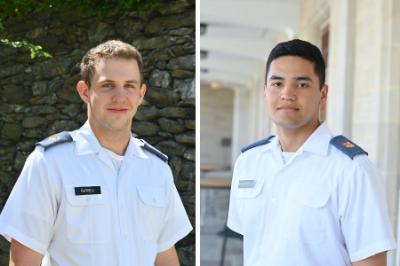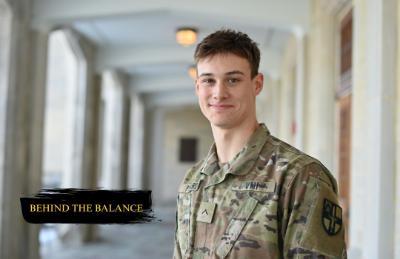Mechanical Engineering
Mechanical Engineering is a broad curriculum which offers a wide choice of careers. Mechanical Engineers deal with the production, control and utilization of energy and motion in systems to benefit society.
Career paths include aerospace, power, HVAC, bioengineering, manufacturing, management, and a host of others.
A unique feature of the mechanical engineering curriculum is the capstone design course through VMI's Cooperative Engineering Center. Cadet teams work on real-world design projects supplied by local industries who are members of the Cooperative Engineering Center with an industry engineer and faculty member as advisors. Cadets write a formal design report and give an oral report to supporting industry.
Cadets may earn a B.S. in Mechanical Engineering, a concentration in Aerospace Engineering, and a concentration in Nuclear Engineering.
The Mechanical Engineering program is accredited by the Engineering Accreditation Commission of ABET, https://www.abet.org, under the commission's General Criteria and the Program Criteria for Mechanical and Similarly Named Engineering Programs.
Degrees and Programs
Major(s): Mechanical Engineering
Degree(s): Bachelor of Science (B.S.)
Concentration(s):
Minor(s):
- n/a
Mechanical Engineering is the second oldest of the engineering professions and has the second largest enrollment of students in the United States. Mechanical engineering is a broad field which includes many areas of study such as refrigeration, air conditioning, energy conversion, nuclear engineering, biomedical engineering, transportation equipment engineering and industrial engineering. Mechanical engineers are employed in the design, operations, sales, energy conservation, research, and management.
The educational objectives of the VMI Mechanical Engineering Program are to produce graduates, who will,
within a few years of graduation,
- have successful careers in industry or the military, or be successfully engaged in post-graduate or
advanced educational studies - be responsible global contributors who uphold strict ethical standards and who continue to develop
their professional skills through sustained engagement in lifelong-learning activities
The potential of our graduates to realize our educational objectives depends on the skills and abilities they have developed through the ME curriculum. Therefore, the department has identified specific Educational Goals and supporting Student Outcomes (SO), related to those skills and abilities, that each cadet should possess by graduation.
Educational Goal 1
Graduates will have the ability to apply the knowledge of mathematics, science, and engineering to engineering problems in the thermal and mechanical areas.
- SO 1.1 Graduates will have the ability to apply the knowledge of mathematics (through statistics, linear
algebra, multivariate calculus and differential equations), science (through chemistry and calculus-based
physics), and engineering to engineering problems in the thermal and mechanical design areas. - SO 1.2 Graduates will have the ability to analyze and design mechanical and thermal systems,
components and processes. - SO 1.3 Graduates will have the ability to design and conduct experiments, and to analyze and
interpret experimental results. - SO 1.4 Graduates will have the ability to use modern computational and analytical techniques, skills,
and tools.
Educational Goal 2
Graduates will possess the professional skills and awareness necessary to responsibly practice engineering in
both a technical and societal context.
- SO 2.1 Graduates will have effective oral and written communication skills.
- SO 2.2 Graduates will have the ability to effectively function on teams.
- SO 2.3 Graduates will have an understanding of their professional and ethic responsibilities.
- SO 2.4 Graduates will recognize their need of life-long learning and will possess the ability to engage
in life-long learning.
Mechanical Engineering in the News
Find out more about the department's cadets and faculty in recent VMI news.

Two Virginia Military Institute cadets, Josiah Farrell ’28 and Anderson Robles-Rodriguez ’28 have been awarded Gilman Scholarships for study abroad this summer. Both will participate in the Taiwan Huayu BEST Program and study Mandarin Chinese at the National Chengchi University in Taipei.

Behind the Balance: Matthew Picard ’27 — Keydet Men’s Swim and Dive
Matthew Picard ’27 vowed he would never attend a military college. One of his teammates in high school ended up going to Virginia Military Institute and he was encouraged to investigate it.
.svg)
.png)